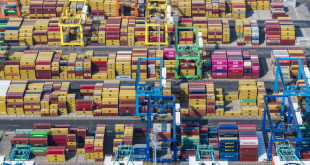The novel coronavirus has hit Africa and set back its pace of manufacturing development. According to the World Bank, the pandemic could possibly cause a loss of $37 billion to $79 billion output in 2020 alone in Africa and result in major disruptions to its manufacturing supply chains. A resilient manufacturing sector has a bearing on people’s livelihoods and social harmony.
Scaling-up its manufacturing sector would reinforce Africa’s economy which has been severely affected by the pandemic by meeting the demand for basic necessities and fueling consumption. Altogether, 43 African countries have closed their borders, seven countries have canceled international flights and three countries have imposed strict entry-exit controls, which has led to huge losses for the tourism and service industries and limited other business activities. Some African economies, such as South Africa and Egypt, are heavily dependent on their tourism and the hospitality industries, which are suffering because of the pandemic. Data of the African Union (AU) reveal that the virus may cause a loss of $50 billion or more for the tourism and travel industries in Africa. Through the readjustment of production chains, African manufacturing industries have significant potential to reduce poverty and makeup for the contraction of other industries.
Since the establishment of the Forum on China-Africa Cooperation (FOCAC), manufacturing has become a critical area and the first priority for the collaboration between China and Africa. Industrial promotion was one of the eight major initiatives proposed by President Xi Jinping at the FOCAC Summit in Beijing in 2018.
Over the past decade, China’s direct investments in Africa’s manufacturing sector have maintained rapid growth. According to the Chinese Ministry of Commerce, China’s investment flows to Africa grew at an average annual rate of more than 45 percent from 2003 to 2018, and China became the fourth-largest investor in Africa in 2018.Through the Belt and Road Initiative, many Chinese State-owned and private enterprises are not only investing in infrastructure in African countries, but also building factories to produce textiles, construction materials, home appliances and pharmaceuticals. These Chinese companies are rich in manufacturing production experience and making a significant contribution to Africa’s economic development.
During the pandemic, in attempts to avoid along period of downtime, many employees of Chinese enterprises in Africa have either stick to their posts or taken charted planes to return to African countries to resume production. For example, the China Communications Construction Company in Mombasa and the China Railway 20th Bureau Group in Cabinda are engaged in building key infrastructure projects in Africa. China’s direct investments in manufacturing industry and infrastructure construction has increased Africa’s resiliency in the face of the pandemic.
China’s continuous economic and trade activities, and various exchanges through digital platforms have reinforced Africa’s economic recovery potential. Hunan province, for example, has established a forum in 2014 to speed up the cooperation between Hunan and African countries on agricultural production processing, farming machines, apparel and other manufacturing subsectors. In the first half of this year, Hunan’s import volume from Africa reached $770 million, up 36 percent year-on-year despite the pandemic, having increased its imports of coffee, cocoa and other non-resource products from African countries.
China-Africa cooperation on manufacturing creates more local employment opportunities, helping African societies maintain stability during the pandemic. The youth population in Africa is more than 200 million, and boosting youth employment in manufacturing has helped keep youth crime rates down. The findings of the AU emphasized that 20 million jobs in the formal and informal sectors could be lost this year. The unemployed of all industries are rushing into the same tight job market. Since the majority of African manufacturing industries are labor intensive, the revival of manufacturing could absorb the large number of unemployed.
China’s experience of human resource management and training can also help Africa form a talent pool. During the pandemic, the manufacturers in the Sino-Uganda Mbale Industrial Park in Kampala maintained steady manufacturing production by adopting strict personal protective measures, which guaranteed stable jobs for local communities, elevated young workers’ technical skills and safeguarded local workers’ livelihoods. Some small and medium-sized African manufacturing enterprises also extended youth employment by an e-commerce project proposed by the UN Economic Commission for Africa (ECA) and Ant Financial of Alibaba, headquartered in Hangzhou, Zhejiang province.
The global COVID-19 pandemic has become a new normal, but the process of industrialization and urbanization in Africa cannot be suspended. At the present, Africa stands at a turning point in the Third Industrial Development Decade for Africa (2016-25) and the continent should catch this opportunity to achieve endogenous economic growth in the post-pandemic period. With global solidarity and partnerships, African countries can realize their industrial dream and achieve the AU’s Agenda 2063 on their own.
The author is an assistant research fellow of the China-Africa Institute and the Institute of West Asian and African Studies at the Chinese Academy of Social Sciences. The author contributed this article to China Watch, a think tank powered by China Daily. The views do not necessarily reflect those of China Daily.
China Daily Global
 Africa -China Review Africa -China Cooperation and Transformation
Africa -China Review Africa -China Cooperation and Transformation
